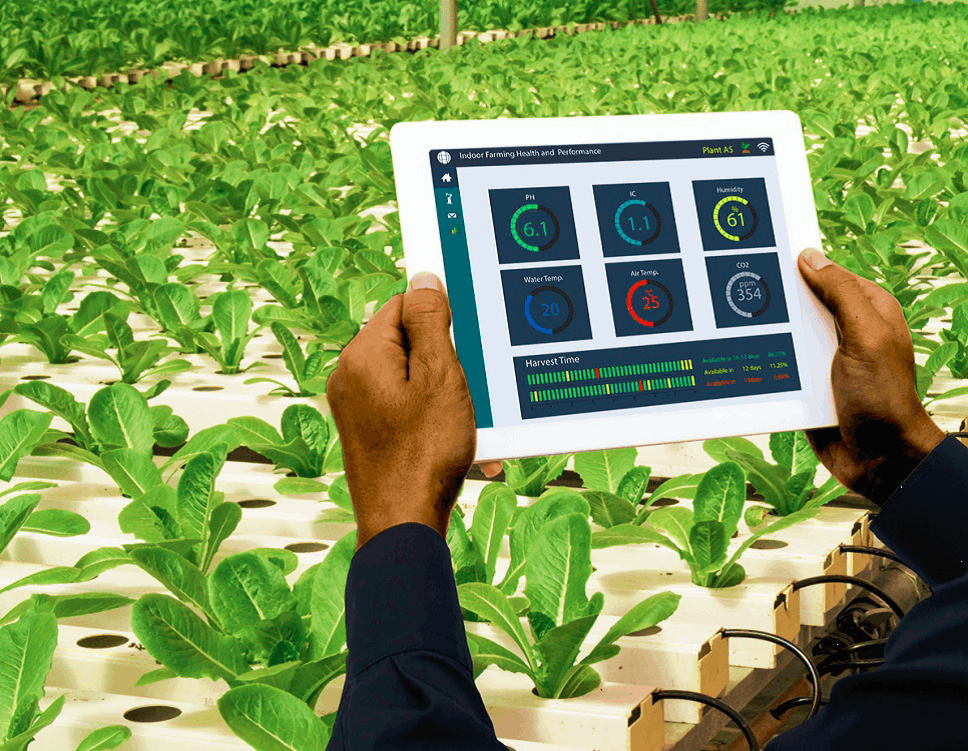The rapid growth and innovation of Information Technology are disrupting how industries and businesses are structured and operated. There is practically no sector or industry that the internet-of-things has not revolutionized. The new approaches and processes that have evolved from these disruptions have created new opportunities that never existed before. They have also created new jobs and skill set that now dominate the disrupted sectors.
Sectors that have been affected by these tech-based innovations include transportation, health, financial services, telecommunications, and sports, to mention but a few.
The agricultural sector is not left behind in this tech-driven revolution. With over 78.5 million hectares of arable land in Nigeria, the rise of digital agriculture in the country comes holding a promise to increase food production, especially with recent efforts taken by the government to diversify the oil-dependent economy with agriculture as a viable alternative.
Despite this renewed government focus, Nigeria’s farmlands remained under-utilized, as only about 41% of the country’s arable is currently farmed. Added to this, the country’s agricultural sector is dominated by smallholder farmers who face the challenge of lack of access to capital, poor mechanization, lack of knowledge of modern practices and high-risk exposure.
To provide digital and tech-driven solutions to these problems in the Agric sector, innovators such as Farmcrowdy, believed to be Nigeria’s First Digital Agriculture Platform, sprung up. They were able to pool more investments into the agricultural sector through crowd-funding via digital channels and platforms. These innovative approaches have attracted a crop of new set of investors who are millennials. They now have tools to help them get involved in the business of farming without becoming farmers.
With more investments, these digitalized Agri-tech platforms operated by internet savvy agricultural entrepreneurs, are in the position to empower rural farmers by providing them with finance improved seeds, farm inputs, training on modern farming techniques and a market for the sale of their farm produce.
In spite of these interventions, Agriculture still remains a risky venture and there is a need to mitigate these risks using innovative insurance solutions. With these insurance policies in place, investors in all sectors of the agricultural value chains are further assured their investments in the pre-upstream, upstream and downstream sectors of the Agricultural value chains are insulated from the shock of a total financial loss arising from perils that are outside the control of the agric investor. This is where Leadway Assurance Company Limited is presently playing a prominent role thereby assisting in guaranteeing the food security of the Nation. .
By partnering with these digitalized agricultural platforms, like Farmcrowdy, Thrive Agric, Agrecourse, Chubi Agro, Bush Colony, Primera Credit Microfinance Bank Limited, Winich Farms, Agrilet, Farmforte Agro, Agroyield Africa and EZ Farming, Leadway Assurance helps to provide a range of Agricultural Insurance protection to their farmers leveraging its range of agricultural insurance policies in its portfolio.
However, as an investor with any of the aforementioned Agri-tech platforms and with their agric ventures insured with Leadway, it is pertinent to note that in the event of a ¬fire or disease outbreaks at the farm; or a natural disaster such as windstorm, flood, and erosion, the investor will be protected as the cost invested in the farm will be paid as compensation.
In other words, Leadway Agricultural Insurance Policies does not provide cover for the investment returns (ROI) value assured by the Agri-tech farms. For emphasis it is the cost of production (COP) also known as the economics of production (EOP) for these insured agric projects that are covered.
“It is critical to understand that the overarching risk that Leadway Assurance undertakes to provide cover for is the probability of financial loss which may occur as a result of unplanned and extreme events. The value we bring to this value chain is the assurance we provide for the direct investment that goes into the agric project. That is the real loss that our agriculture insurance team has identified, strategically evaluated and the right agricultural insurance solutions designed.
The investment made by the sponsors does not fall into this category. So individuals who intend to invest in Agri-tech should have a clearer understanding of how their investments and returns have been adequately protected by the digitalized agri-tech platforms. ”, Leadway’s Head of Agric Insurance Mr. Ayoola Fatona said.
For the avoidance of doubt, the Leadway’s Agricultural Insurance policies cover accident to machinery, produce storage facility, poultry, livestock, and ¬fish farm. Its multiple perils Crop Insurance Policy insures farms against the risk of physical loss or damages to crops which may arise from fire, lightning, flood, explosion and other covered perils. Insurance policies are also available for all activities across the entire agricultural value chain.
The Leadway Farm Property and Produce Insurance Policy, on the other hand, provides cover for your farm assets (houses, farm properties, machinery/equipment etc) and agricultural produce stored in designated warehouses against accidental destruction by fire, lightning, flood, explosion, and other elemental perils covered in these policies.
The foremost insurer also has the Fish Farm, Poultry and Livestock Insurance Policies that cover the farmer from financial loss in the event of the death of livestock, birds, fish stock or the collapse of the fish pond by paying you the assessed value of losses incurred.
Suffice that these insurance policies are neither sacrosanct nor cast in stone as Leadway offers bespoke and customer centric insurance solutions that will meet the specific risk management needs of the agric investor across the entire agricultural value chain.
For more information on how our Agricultural Insurance package works, please call our customer care service on (01) 2800 700, 2800 701, +234 812 999 7175 or send an email to for more details.











